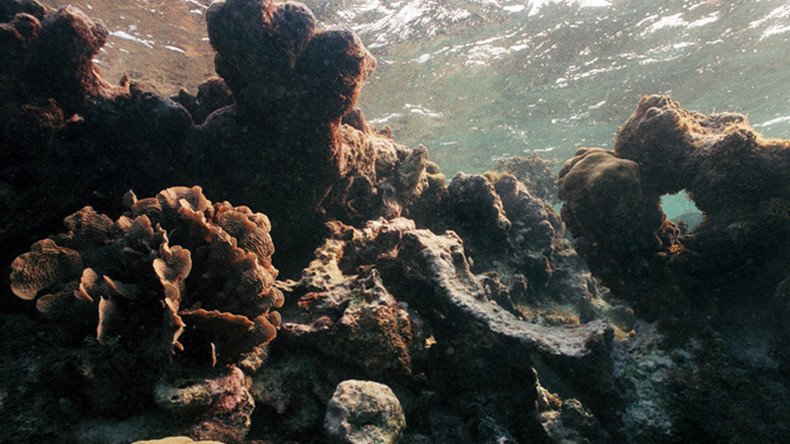Coast to ghost: Florida’s coral reefs dissolving ‘just like a sugar cube’

Florida’s tract of coral reefs has the honor of being the third-largest barrier reef ecosystem in the world. However, it could soon be a thing of the past, as the acidification of the ocean’s water is dissolving it faster than it can rebuild.
Research from the Rosenstiel School of Marine and Atmospheric Science at the University of Miami indicates that parts of the reef in the northern Keys are eroding more rapidly than they are calcifying – a rate surpassing previous estimates. Earlier research suggested that the reefs wouldn’t reach their current rate of erosion until 2050, the Washington Post reported.
‘Environmental breakdown’: Florida Bay hit with huge seagrass die-offhttps://t.co/XxzhR7KYzppic.twitter.com/zqZqMUgsjl
— RT America (@RT_America) April 28, 2016
The Florida Keys’ coral reef tract has had a difficult few years, experiencing bleaching and contracting fatal diseases. As a result, it is suffering from a massive die-off. Brian Walker, a Nova Southeastern University research scientist, told the Sun Sentinel, “We saw a variety of diseases across the different corals. Some of the disease was recently active and had killed off a significant portion of the colony. It’s wiped out entire species from parts of the reef. They’re usually bleached white. You can see areas of just bare skeleton.”
What’s to blame for the devastation? The government. Just kidding! It’s pollution. When carbon dioxide dissolves in water, the ensuing reaction lowers the pH balance of the ocean. Water becomes more acidic as a result. Other factors, such as the ocean-warming El Nino weather pattern, have not had positive effects either.
Limestone compromises the skeletons of coral reefs, but when combined with acidic water, it dissolves “just like you dropped a sugar cube in water,” Chris Langdon, study co-author and chair of the University of Miami’s department of marine biology and ecology, told the Washington Post.
Parts of the reef closer to Miami could be eroding even faster due to the environmental stresses created by pollution and human activity. However, erosion would typically take place further south where the water is colder, as water holds more dissolved carbon dioxide at lower temperatures.
Illegal 'fracking-like' oil drilling halted in ecologically-sensitive Florida Everglades http://t.co/HzZv0qURBN
— RT America (@RT_America) May 12, 2014
Now that the Florida reef is undergoing both erosion and bleaching it is extremely vulnerable, and as it teeters on the brink of collapse, so does Florida’s $3 billion reef-related tourist industry. The reef’s ecosystem is also important to the local economy that relies on fish and marine life.
As bad as this all may seem, the worst could be yet to come. “This is concerning because the 2016 summer is predicted to be as hot if not hotter on the reefs,” Brian Walker wrote in an email to the Washington Post.












